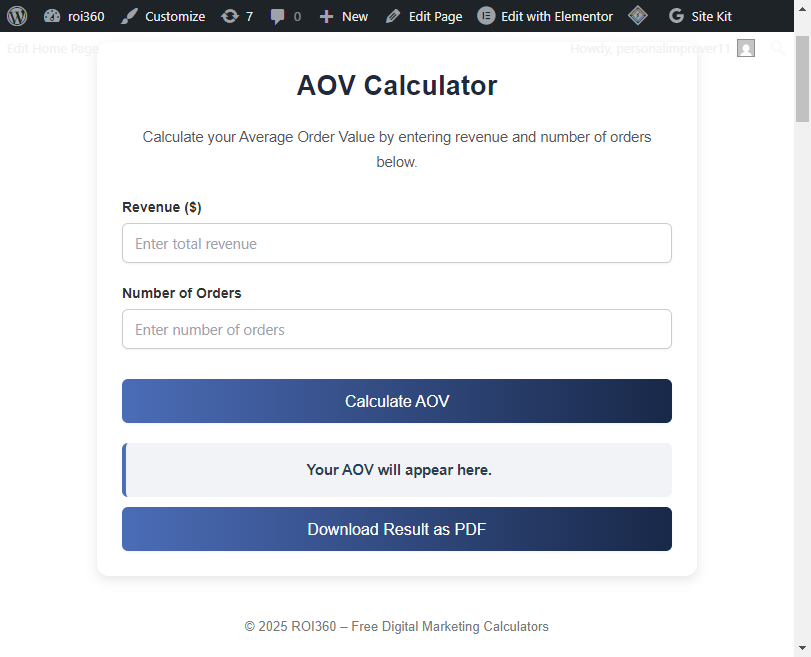AOV Calculator
Calculate your Average Order Value by entering revenue and number of orders below.
Explore More Free Digital Marketing Calculators
Looking for more tools to improve your marketing performance? Try our complete collection of free digital marketing calculators below. From ROI and CTR to CLV, CAC, and NPS, each calculator helps you measure, analyze, and optimize your campaigns with ease.
- ROI Calculator
- CTR Calculator
- CPC Calculator
- CPM Calculator
- Conversion Rate Calculator
- Bounce Rate Calculator
- CLV Calculator
- CAC Calculator
- ROAS Calculator
- Gross Margin Calculator
- Engagement Rate Calculator
- Email Open Rate Calculator
- Email Click Rate Calculator
- CPL Calculator
- Video CPM Calculator
- Share of Voice Calculator
- Churn Rate Calculator
- Retention Rate Calculator
- AOV Calculator
- NPS Calculator
AOV Calculator – Measure Average Order Value for Your Business:
In eCommerce and digital marketing, success depends on more than just sales volume. To truly understand profitability, you need to measure how much each customer spends per order. This is where Average Order Value (AOV) comes into play.
Our free AOV Calculator is a powerful digital marketing calculator that allows businesses to instantly calculate the average revenue generated per order. By tracking AOV, you can make smarter pricing, marketing, and upselling decisions that drive growth.

What is AOV (Average Order Value)?
AOV (Average Order Value) is the average amount of money customers spend each time they place an order.

AOV = Total Revenue ÷ Number of Orders
Example:
Revenue = $10,000
Orders = 500
AOV = $10,000 ÷ 500 = $20 per order.
Why AOV Matters in Digital Marketing?
Measures sales efficiency
Helps set revenue goals
Optimizes pricing and product bundling
Identifies upsell and cross-sell opportunities
Directly impacts profitability and ROI
A higher AOV means customers are spending more per order, increasing overall revenue without needing more traffic.
How to Use Our AOV Calculator?
Enter your total revenue.
Enter your total number of orders.
Click Calculate.
Instantly get your Average Order Value (AOV).
This digital marketing calculator works for eCommerce stores, SaaS companies, agencies, and even service-based businesses.
Example AOV Calculations:
Example 1: eCommerce Store
Revenue = $25,000
Orders = 1,000
AOV = $25
Example 2: SaaS Business
Revenue = $5,000
Orders = 200
AOV = $25
Example 3: Online Course Platform
Revenue = $50,000
Orders = 2,500
AOV = $20
AOV Benchmarks by Industry:
Fashion & Apparel: $75–$120
Beauty & Cosmetics: $50–$80
Electronics: $200–$300
SaaS Subscriptions: $20–$50
Food Delivery: $25–$40

Factors That Influence AOV:
Product Pricing – Higher-priced products naturally increase AOV.
Upselling & Cross-Selling – Add-ons and bundles raise order values.
Discount Strategy – Minimum purchase discounts boost AOV.
Customer Demographics – Different segments spend differently.
Marketing Strategy – Personalized offers improve AOV
Strategies to Increase AOV:
Bundle products together.
Offer free shipping on minimum spend.
Create tiered discounts (Buy 2, Get 1 Free).
Recommend related products at checkout.
Upsell premium versions of products.
Introduce subscription models.
Launch loyalty and reward programs.
AOV vs CLV (Customer Lifetime Value):
AOV measures revenue per order.
CLV measures total revenue from a customer over their lifetime.

Common Mistakes in AOV Tracking:
Ignoring seasonal fluctuations.
Using revenue without including discounts.
Not segmenting AOV by customer type.
Over-relying on discounts to boost AOV
Conclusion:
The AOV Calculator is an essential digital marketing calculator for businesses looking to maximize revenue and profitability. By calculating Average Order Value, you can:
Improve upselling and cross-selling strategies
Boost customer spending per order
Increase ROI without extra ad spend
Benchmark against industry standards

Item #1
Depends on industry, but generally $50–$100 is strong for eCommerce
Item #2
Yes, through upselling, bundling, and minimum purchase incentives
Item #3
Weekly for active stores, monthly for stable businesses
Item #4
Yes, it helps measure average revenue per transaction
Item #5
Yes, higher AOV improves margins by spreading fixed costs
